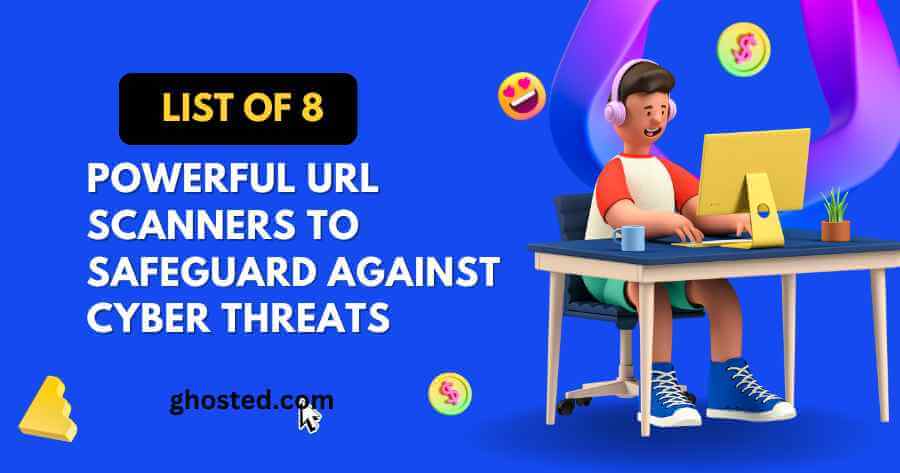URL Scanners are powerful tools that can assist in protecting against cyber threats. They can identify untrustworthy domains, suspicious links and potential phishing URLs to help keep you safe from harm.
These scanners are user-friendly and efficient. They can help prevent malware infections as well as free vs. subscription plans.
Table of Contents
Toggle1. URLVoid
Malicious domain scanners are online tools designed to defend websites, their users, and data against hacker attacks. These security solutions are user-friendly and offer information about a domain’s history and reputation.
URLVoid is a free link checker tool designed to scan any website for malware and other potential security risks, by checking multiple blacklist services and online reputation tools to detect websites involved in malware incidents and phishing activities. In addition, URLVoid also offers a safety report of each URL it checks; to use its services it requires connecting to their server using their API Key or User Identifier as well as performing automated operations – however integration with commercial services is currently unavailable.
2. Norton Safe Web
Norton Safe Web is a browser extension that helps safeguard devices against online threats like malware, spyware and phishing. It comes standard with device security plans from Norton Antivirus to help keep users secure online.
This scanner checks links against domain risk history information to determine whether websites may harbor hidden files containing malicious software, even those considered trustworthy may hide hidden malware that leads users to download viruses or tech support scams.
Blacklist registry libraries and deep learning algorithms analyze target URLs. Reputation services and web page content analysis also detect possible risks to ensure the safety of online visitors.
3. Google Transparency Report
Malicious URL scanners use blacklists and deep machine learning techniques to safely check phishing links and detect malware. IPQS leverages 100% proprietary data with real-time threat intelligence to scan malicious domains with more accuracy than comparable security tools.
The Google Transparency Report is a biannual report that tracks requests by governments worldwide for user data and also features a searchable library of political ads.
A new tool on Google.com helps distinguish between regular service interruptions from government interference and government-induced ones and compares requests against data usage trends over time. However, due to its current design, it makes this difficult.
4. Email Veritas
Email Veritas is a free tool designed to detect malicious URLs. It analyzes links against domain risk history in order to detect potential threats and vulnerabilities on sites visited, while simultaneously protecting you against phishing attempts and warning of potentially hazardous websites prior to visiting.
Snippet View provides an effective means of protecting against phishing attacks and malware infections while reviewing violations quickly. It can scan password-protected pages that other scanners miss as well. It provides effective defense from phishing attacks and malware infections while offering quick review features of violations.
Comodo cWatch is a SaaS website malware scanner. It provides strong DDoS protection while increasing application performance overall while helping prevent cross-site scripting attacks and infections.
5. Bitdefender Traffic Light
Bitdefender is an esteemed security software provider known for its comprehensive range of security programs – including its free antivirus and antimalware programs as well as its browser extension which takes browsing security one step further by constantly scanning websites for malware, phishing attempts and fraud in real-time.
Search results are also scanned and any potentially hazardous links are marked with green or red icons, as are any suspicious posts to your Facebook wall and Twitter feed that it detects and blocks them.
TrafficLight’s tracker reveal feature is designed to identify trackers that may be found on websites and block only parts that contain malicious elements; so you can continue viewing pages without risking your privacy.
6. WhoisXML API
WhoisXML API is a company offering domain and Internet Protocol (IP) data intelligence solutions, including software suites, API packages, web tools and cyber threat intelligence feeds. Their services are relied upon by law enforcement units, banks, marketing researchers, investment firms and government agencies alike.
Users of this tool can quickly check a URL’s safety by scanning it against a list of known malware and spam websites, while it also provides a trust rating and risk score to assist users in deciding if visiting is safe or not.
This provider provides domain reputation and infrastructure analysis via API and GUI lookup tools, with evaluation tools that assess a domain or IP address’s reputation according to multiple security data sources and an instant host audit procedure.
7. Sucuri
Sucuri is an established website security provider and their malware scanning tools provide thorough protection. Their scanner can analyze any computer or server remotely – making Sucuri a great choice for businesses.
Sucuri’s proprietary threat data and scanning engine provides greater insight than competing malware scanners. Their scanner can identify phishing attacks and malware risks while also analyzing website technologies and domain infrastructure.
Developers can leverage an API to customize their scans and integrate them with internal workflows, while the software supports custom HTTP headers and multiple device screenshots, further improving the security analysis experience. Furthermore, this tool doesn’t put undue strain on disk usage – an added plus!
8. Google Safe Browsing
Most people are familiar with Google’s Safe Browsing service and its red warning screens which alert visitors when visiting websites suspected to contain phishing attacks or downloads that could contain malware. This feature is built into both Chrome and other web browsers; additionally it’s integrated into search results from Google Search results.
The Lookup API enables clients to query servers for verdicts on specific URLs (the server only knows which hashed URLs were queried). Meanwhile, the Update API caters to clients making frequent, low-latency requests using the Comodo cWatch security-as-a-service model; this software detects websites for malware infections and other vulnerabilities like phishing attacks so administrators can take necessary action in order to secure them.
Frequently Asked Questions
What are the must-have features of a URL scanner?
Essential features include real-time scanning, a comprehensive database of known threats, and the ability to detect zero-day phishing attempts. Look for scanners that offer these functionalities to ensure maximum security.
How do URL scanners identify malicious links?
URL scanners use databases of known malicious URLs, apply machine learning algorithms to detect anomalies, and perform heuristic analysis to uncover suspicious patterns indicative of malware or phishing.
Can URL scanners effectively prevent phishing attacks?
Yes, by analyzing web content in real time and comparing it against databases of known phishing sites, URL scanners can alert users about potential threats before they interact with harmful content.
What are the advantages of using a URL scanner?
The primary benefits include enhanced online security, protection against malware and phishing attacks, and peace of mind knowing that the websites you visit are safe.
Are there any downsides to using URL scanners?
e cons include potential false positives that may block legitimate websites, and a slight delay in browsing speed due to real-time scanning processes.
How much do URL scanners cost?
Pricing varies widely based on features and coverage. Options range from free basic services to premium subscriptions with advanced capabilities. It’s important to evaluate your needs against available pricing plans.
How do I choose the best URL scanning tool?
Consider your specific needs such as browsing habits and risk level. Review top tools for their features, effectiveness in detecting threats, ease of use, and pricing. Making an informed decision involves weighing these factors according to your personal or organizational requirements.




